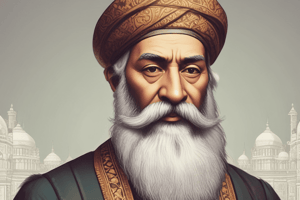Podcast
Questions and Answers
What position did Sir Syed Ahmed Khan achieve in the British judicial service?
What position did Sir Syed Ahmed Khan achieve in the British judicial service?
- Sadr-e-Amin (correct)
- Legal Advisor
- Chief Justice
- District Magistrate
Sir Syed Ahmed Khan believed that Muslims were gaining economic power after the War of 1857.
Sir Syed Ahmed Khan believed that Muslims were gaining economic power after the War of 1857.
False (B)
Name one of the significant works written by Sir Syed Ahmed Khan.
Name one of the significant works written by Sir Syed Ahmed Khan.
Asar-al-Sanadeed
Sir Syed Ahmed Khan was born in the year _____ in Delhi.
Sir Syed Ahmed Khan was born in the year _____ in Delhi.
Match the following concepts with their descriptions:
Match the following concepts with their descriptions:
Flashcards are hidden until you start studying
Study Notes
Sir Syed Ahmed Khan
- Sir Syed Ahmed Khan was born in 1817 in Delhi, India.
- His family had a history of service to the Mughal emperors.
- Sir Syed received a comprehensive education in Islam and the British system.
- He joined the British judicial service in 1838, and quickly rose to the rank of Sadr-e-Amin.
- This was the highest rank attainable by an Indian in the judicial service at the time.
Sir Syed's Writings
- Sir Syed Ahmed Khan wrote extensively on the history of the British Empire in India and the history of the Muslims there.
- He published notable works such as Asar-al-Sanadeed (1847) and Silsilat-ul-Mulk, which documented historical monuments, emperors, and monarchs of India.
- He also wrote extensively on religious topics.
The Impact of the 1857 War of Independence
- The 1857 War of Independence reinforced Sir Syed's belief that the Muslims were declining in economic, social, and religious standing in India.
- Muslims had lost their economic power and influence in society.
- They had resisted education provided by the British, unlike Hindus who integrated into the new system of British rule, embraced English language, and achieved economic prosperity.
- Sir Syed Ahmed Khan became a prominent figure of reform and revival within the Muslim community, advocating for education and modernization.
Studying That Suits You
Use AI to generate personalized quizzes and flashcards to suit your learning preferences.




